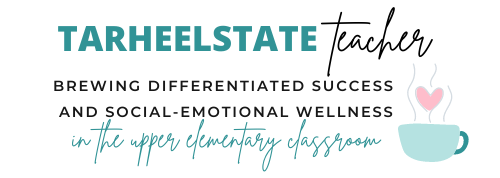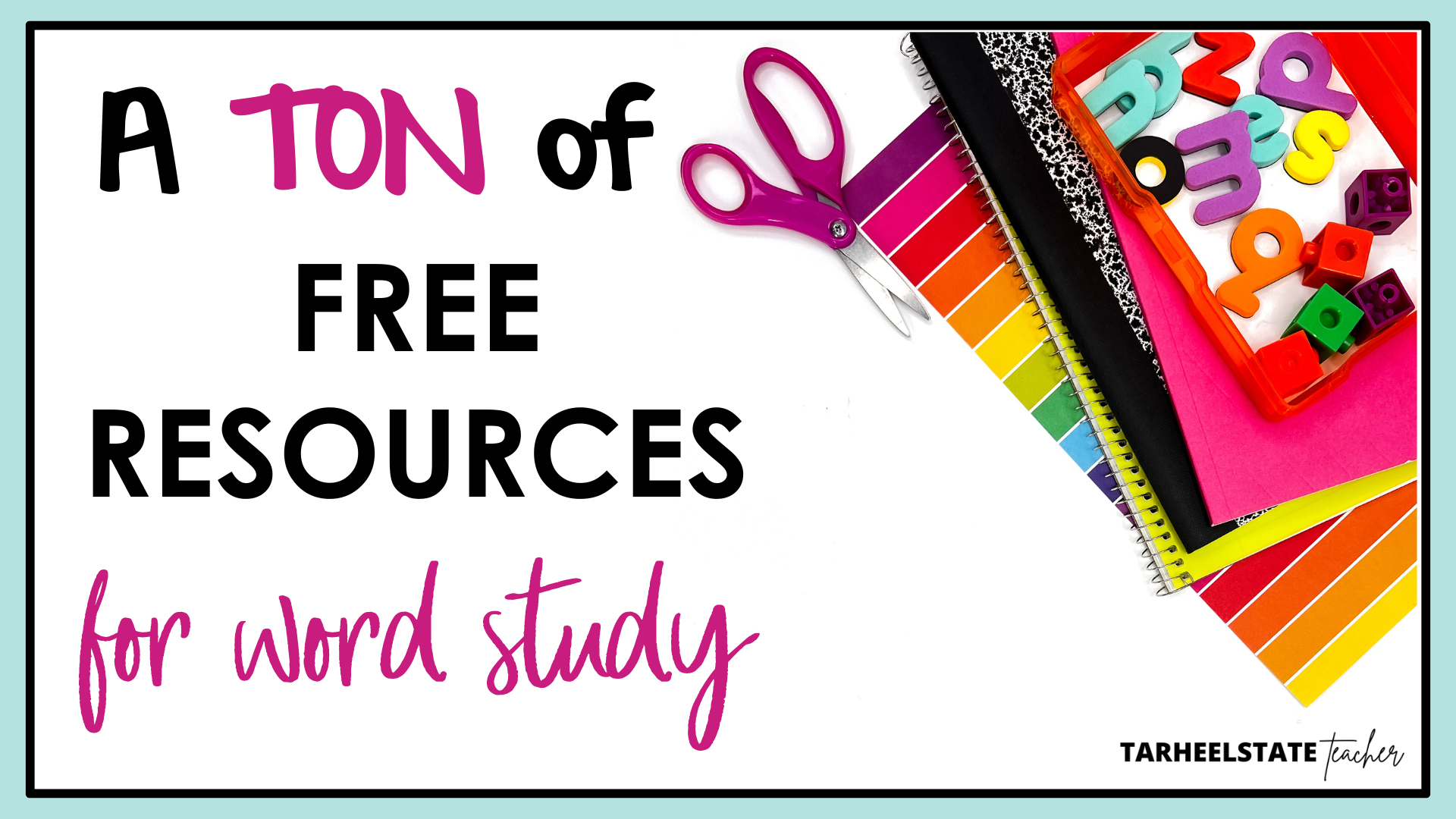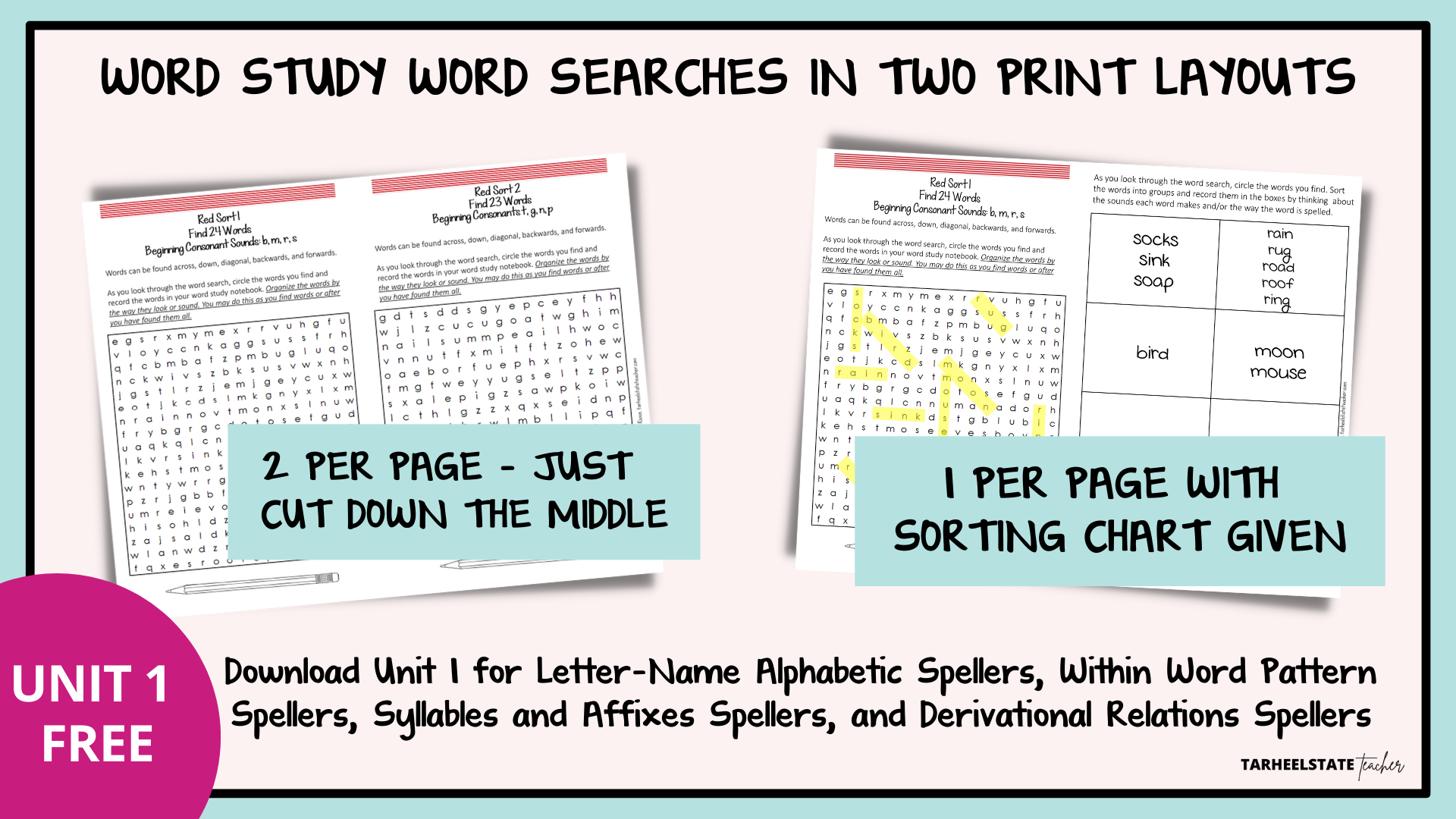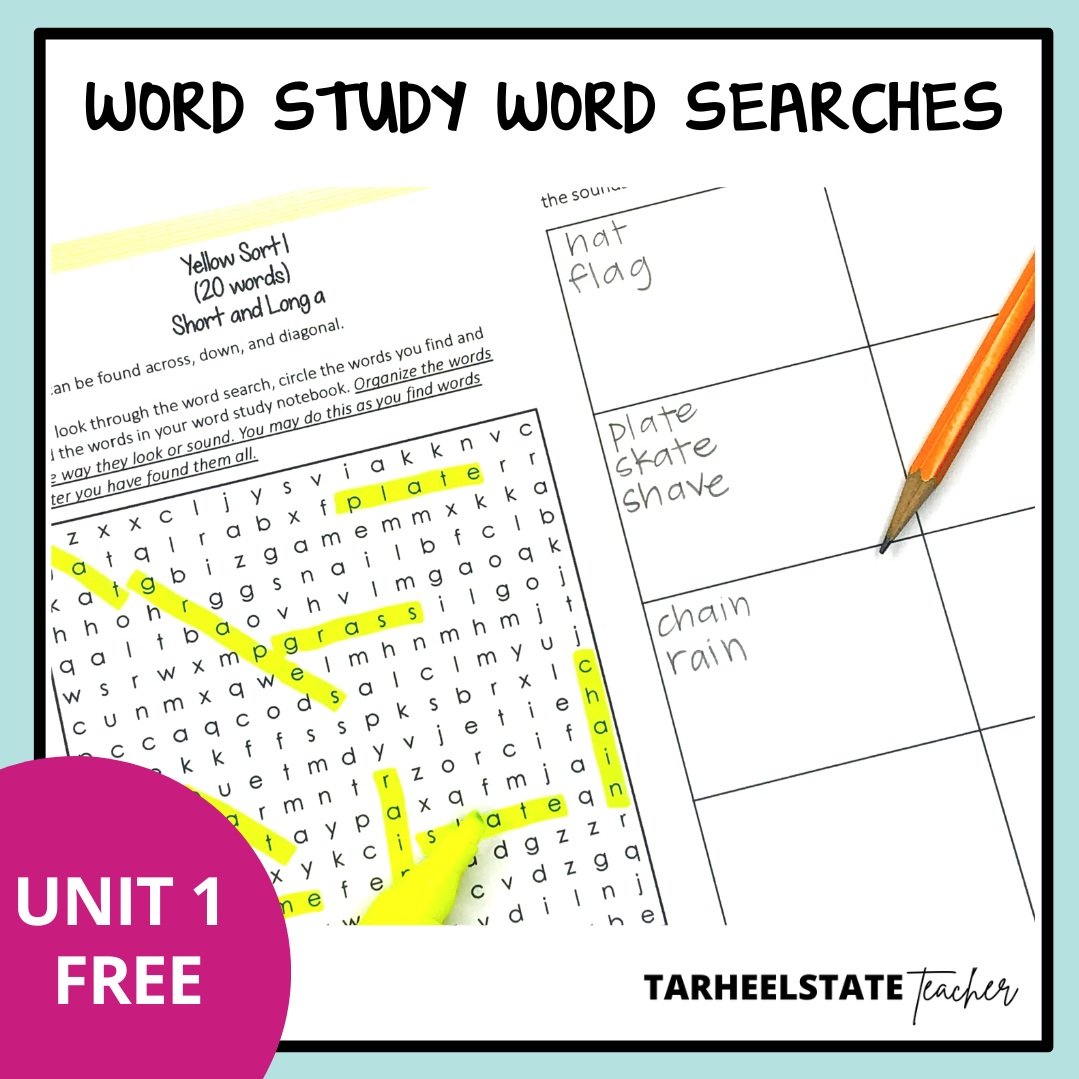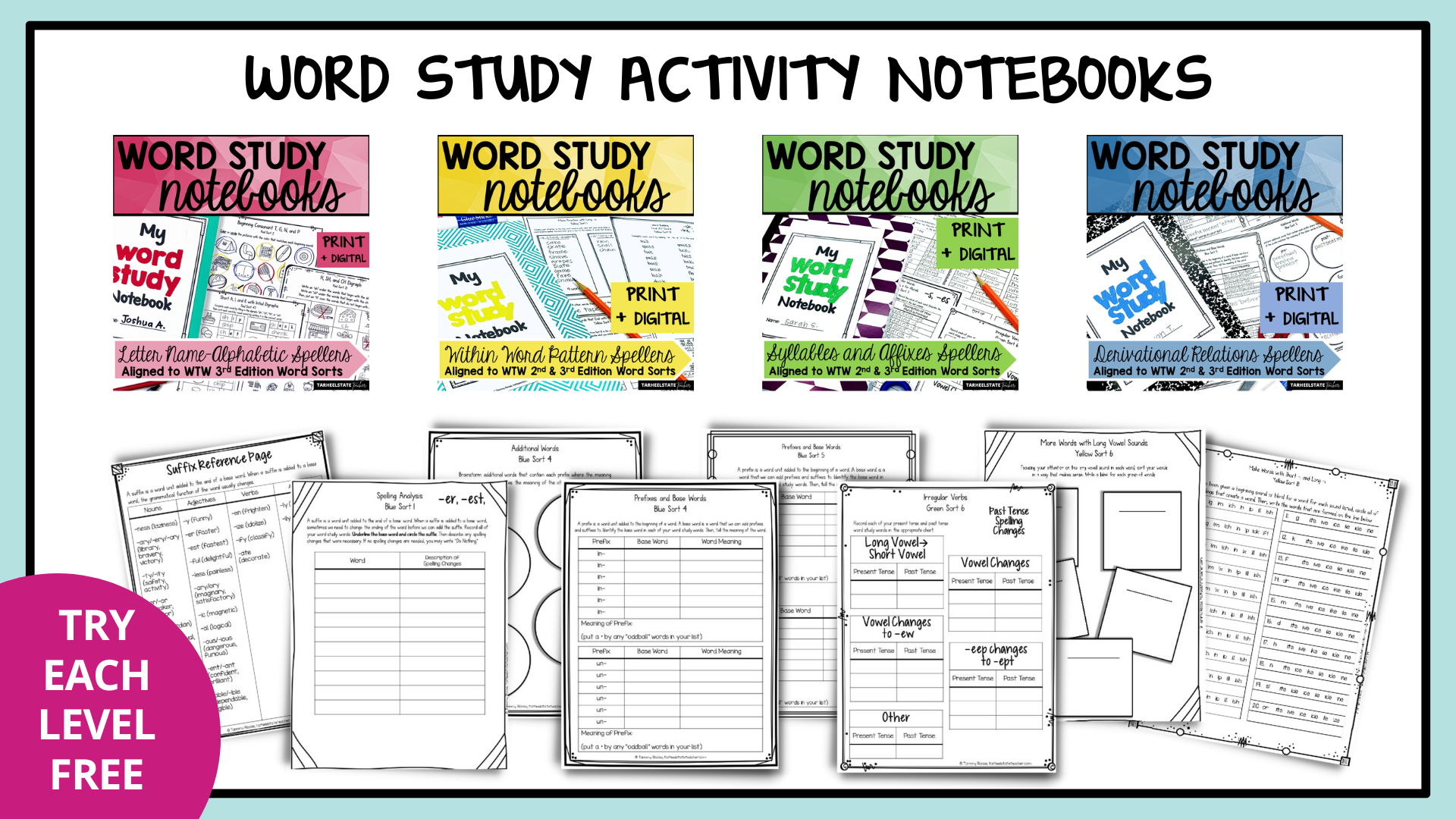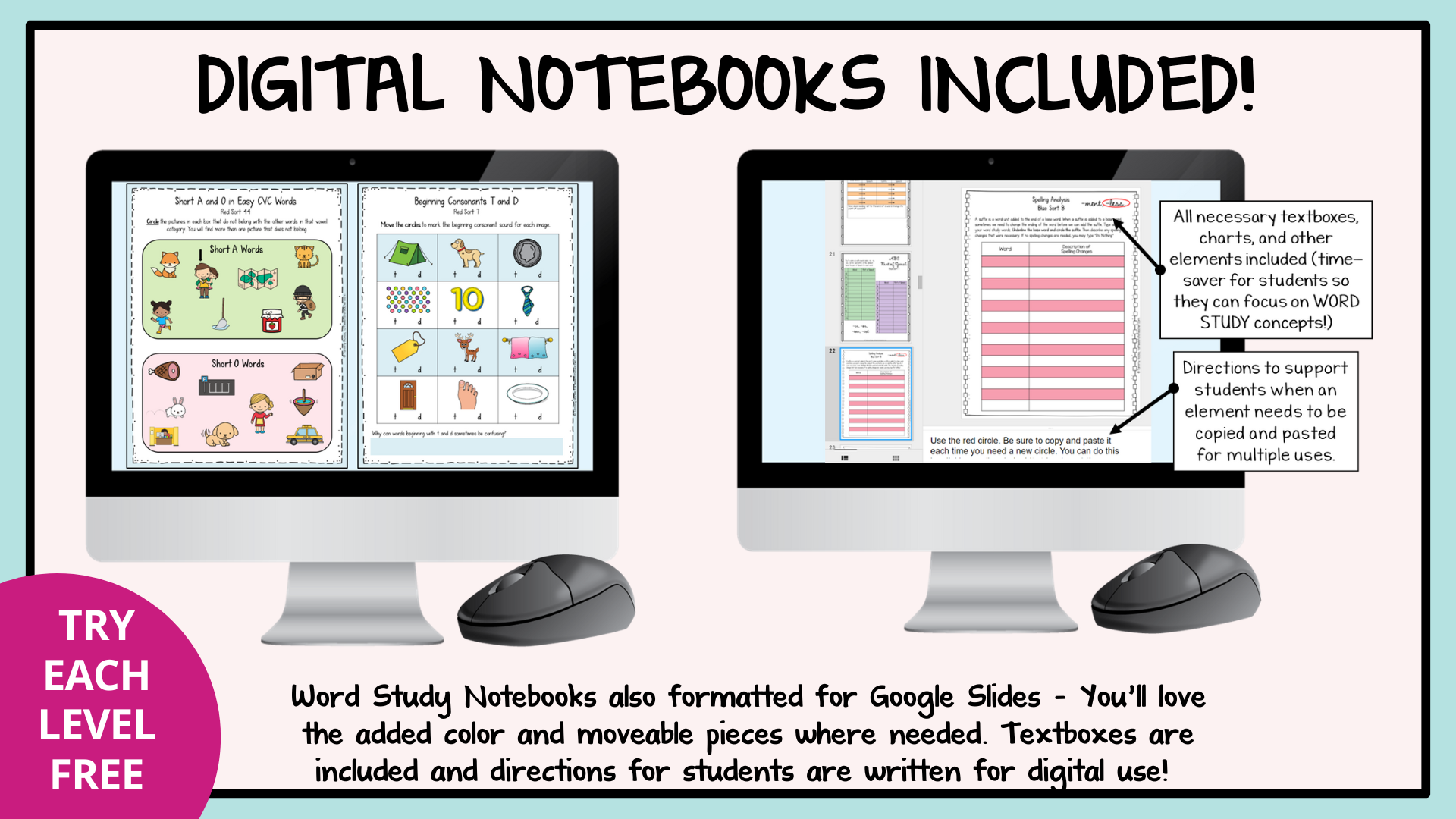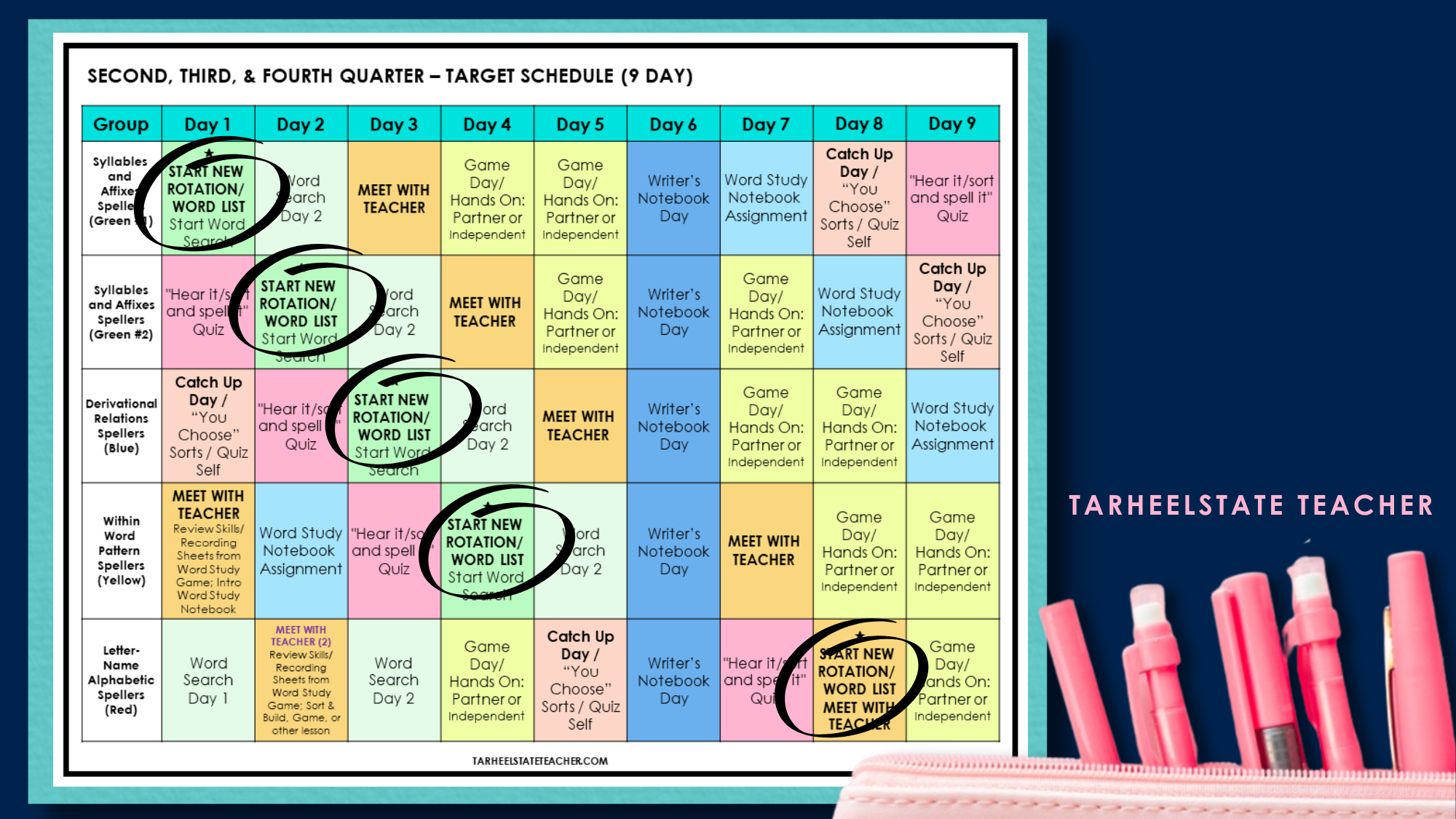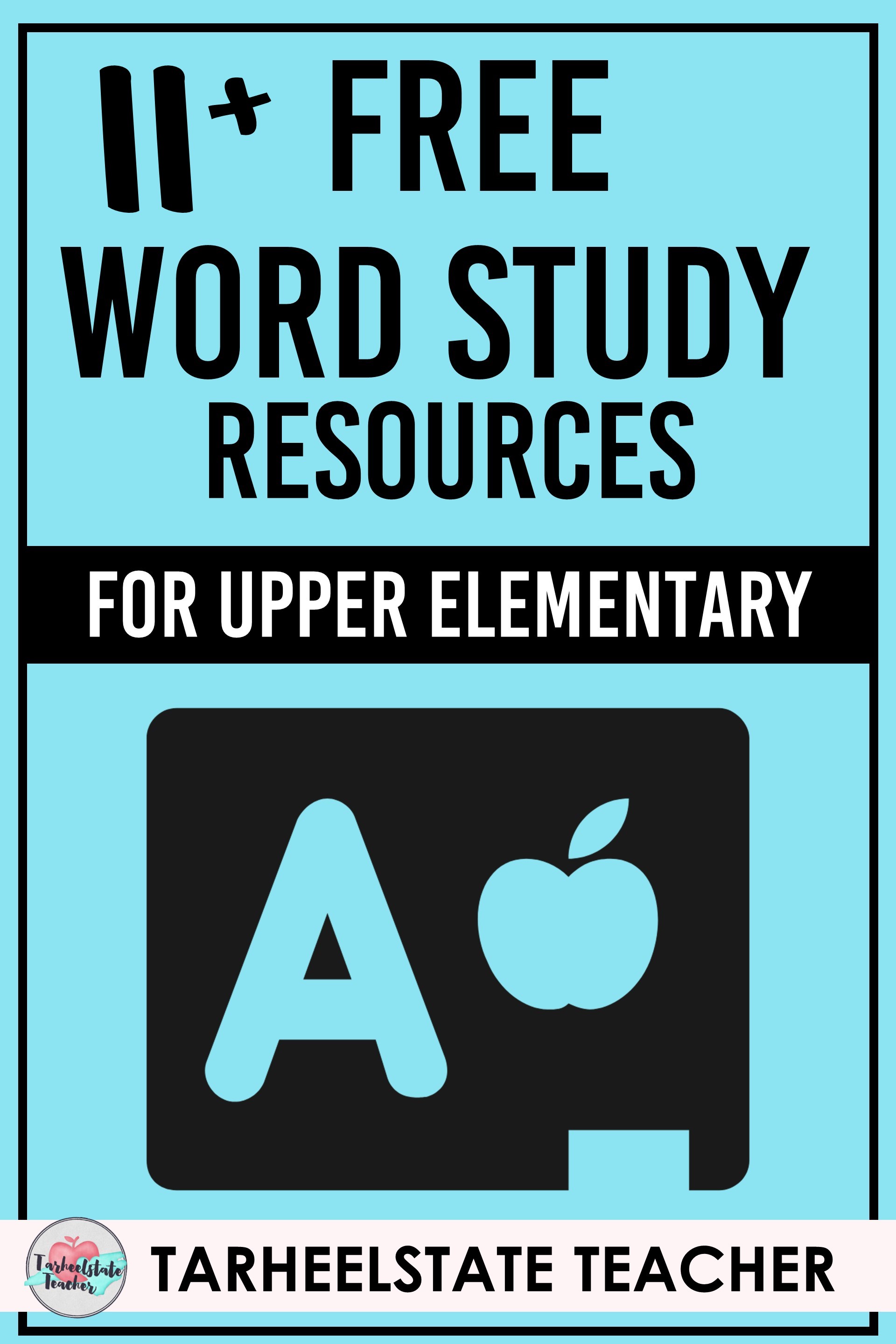Words Their Way Free Resources for Word Study
Are you looking for resources and ideas for implementing Words Their Way? How about a weekly schedule that actually works? (Spoiler alert—it’s best to have a schedule that spans more than a week!) Over the years, I’ve developed quite a few resources and activities with Words Their Way alignment that have helped me provide my students with more exposure to their word lists, extra practice, and more engagement. These activities have helped my students delve deeper into word study concepts and master their words more easily than with a traditional spelling routine.
I’m sharing FREE samples of the word study activities that have made my word study program a huge success in many 3rd, 4th, and 5th grade classrooms including my own! The resources are aligned to the 2nd Edition word sort books (published 2009) or the 3rd Edition word sort books (published 2018). Each PDF will open in your web browser for easy downloading and you can have all of the word study activities sent straight to your inbox. Read on to see what word study activities and resources are available to you to try for free!
The following resources are meant to complement a word study routine and program using the Words Their Way word sort books that come in levels based on developmental spelling stages. As a 4th-5th grade teacher, my students fall within one of the four main developmental stages: Letter Name-Alphabetic Spellers, Within Word Pattern Spellers, Syllables and Affixes Spellers, or Derivational Relations Spellers. However, within the paid resources, I have included a teacher reference PDF with the word lists for each level so that any teacher can implement the activities in their classroom.
In this blog post, you can grab resources for Unit 1 for each of these stages!
WORD STUDY WORD SEARCH ACTIVITY FREEBIES
If you are familiar with Words Their Way, then you know that a "blind sort" is an activity where students sort the words from their word lists into categories (and write them down) as they hear the words called out. It's called BLIND because students are not looking at the words.
One year, the idea of "blind searching" using a word search that does not contain the students’ word sort word list came to my mind. By "blind searching" through a word search without having a list of the words contained in the word search, students have a fun way of discovering the word patterns for their upcoming word sort/word study list.
Discovery Word Searches are an engaging, fun way for students to sharpen their ability to recognize words that ARE spelled correctly (which I've found is a major key to spelling improvement). In a discovery word search, when students find words in their word search, they sort the words into categories based on the look of the word and/or the sounds in the word (just like when sorting words with word sort activities!).
FREE UNIT 1 WORD SEARCHES FOR WORDS THEIR WAY WORD SORTS
1) Letter Name-Alphabetic Spellers Word Searches
2) Within Word Pattern Spellers Word Searches
3) Syllables and Affixes Spellers Word Searches
4) Derivational Relations Spellers Word Searches
👉 Click the button below to grab your FREE Word Searches. The PDF will open in a new window where you can download and print the file!
If you love the Unit 1 freebies and want more, you can find all my Words Their Way Word Searches here!
UNLOCK THE LIST - FILL IN THE BLANK LETTERS ACTIVITY
My newest addition to the word study resources family, Unlock the List is a spelling activity that transforms the typical phonics or spelling word sort into a fun, challenging puzzle that increases students' engagement and enhances their spelling skills. As students unlock words, they'll begin noticing connections among them, prompting them to analyze spelling patterns, vowel sounds, and word structures in order to uncover the word study focus of the word list.
⭐ You can use Unlock the List instead of word searches as an entry point into students' next word study list before they’ve seen it or as an activity that comes after they've completed their word search or word sorts and have been introduced to the word list.
👉 Click the button below to check out the Unlock the List activity. The PDF will open in a new window where you can download and print the file!
If you love the challenge Unlock the List will provide your students, you can find all of the Unlock the List Resources here.
WORD STUDY ACTIVITY NOTEBOOK FREEBIES
After incorporating word searches into my word study routine, I found that I was always piecing together extension activities for my Derivational Relations group (the higher group of students who always seems to need something more to do for word study). After meeting the needs of this group haphazardly for my first year’s implementation of Words their Way, I finally sat down and created individual extension activities that made sense for each of the Derivational Relations Spellers word lists. Later, I created similar notebook activities for Letter Name-Alphabetic Spellers, Within Word Pattern, and Syllables and Affixes Spellers.
These word study notebook activities are meant to give students more structure as they delve into building a deeper understanding of the words and spelling patterns on their word list. For a number of the sorts, extension activities are also included. While the activity sheets are designed for independent exploration, students often need support in learning how to complete the activity pages. I recommend a gradual-release approach to using these word study notebook activities. Incorporate the pages as extension activities or use to guide your small group lessons.
Here’s an idea of the activities students may be asked to complete:
In the Letter Name-Alphabetic Spellers activities, students may be asked to distinguish between beginning consonant sounds, create words by matching a beginning sound to same-vowel and mixed-vowel word family endings (onsets +rimes), identify and represent initial sounds in words beginning with digraphs and blends, separate individual phonemes and blend them together to create CVC words, compare and contrast how preconsonantal nasals change the spelling and pronunciation of a word, sort words with r-controlled vowels from CVC words containing an r before the vowel, match contractions to their expanded form, and more!
In the Within Word Pattern Spellers activities, students may be asked to identify short- and long- vowel sounds, create words given a beginning sound or blend + an ending (onsets + rimes), choose the correct beginning letters, vowels, or rime to complete a word, write "silly sentences" to apply the meanings of homophones, create contractions, make words plural, and more!
In the Syllables and Affixes Spellers activities, students may be asked to describe spelling and sound changes when suffixes are applied, derive word meanings from prefixes and base words, identify parts of speech, describe how long vowel sounds are formed, brainstorm words that contain a given word part, add correct endings, choose correct blends, apply the meanings of homophones and homographs, and more!
In the Derivational Relations Spellers activities, students may be asked to derive word and prefix meanings from prefixes and base words, generate words by adding suffixes, brainstorm words that contain a given word part, describe spelling and sound changes when suffixes are applied, identify parts of speech, write "silly sentences" with different versions of a base word, research the etymology of Greek and Latin word parts, and more!
FREE WORD STUDY NOTEBOOKS FOR WORDS THEIR WAY WORD SORTS (PAPER-BASED)
👉 Click each button below to grab your FREE Word Study Notebooks. The PDFs will open in a new window where you can download and print the files!
5) Letter Name-Alphabetic Spellers
6) Within Word Pattern Spellers Notebook Activities
7) Syllables and Affixes Spellers Notebook Activities
8) Derivational Relations Spellers Notebook Activities
DIGITAL GOOGLE SLIDES VERSION - ALSO AVAILABLE FOR WORD STUDY NOTEBOOKS
I’ve formatted each set of word study notebook for Google Slides. This allowed me to include colorful images and tables. All textboxes and moveable pieces are included for students’ ease of use.
Contained in the download below, you’ll find links to three levels of word study notebook activities. Click those links to make a copy of the Google Drive activities for you to see them for yourself!
👉 Click the button below to grab your FREE Digital Word Study Notebooks. The PDF will provide you with Google Slides links that will prompt you to make a copy for your own drive.
If you love the Unit 1 freebies and want more, you can find all my Words Their Way Word Study Notebook Activities here (printable + digital)!
FREE WORD STUDY TEACHER GUIDE
9) When I send you your mega-file of free word study resources, you’ll also receive a word study guide where I share a peek into how I implement my upper-elementary word study routine using the Words Their Way word sort books. You’ll learn how and why I broke away from the Monday-Friday scheduling cycle and the activities in the 7, 8, or 9 day routine that I use instead. I share tips for differentiating your word study program for different groups, creating a schedule, and organizing your word study materials.
You can find much of this information by hopping around my word study blog series, but I've turned it into an e-book to make it printable and easy to refer to as you plan for and implement your own word study program. If you’ve downloaded the Guidebook in the past, you’ll want to download it again, as it received a huge update in the summer of 2022!
FREE SAMPLE SCHEDULE FOR A 7, 8, or 9 DAY WORD STUDY CYCLE/ROUTINE
Would you like to customize your own word study schedule using the template above?
I’ve created a schedule that you can customize in Google Slides. Just click here or the button below to grab your own copy of this schedule. The link will prompt you to make a copy for yourself. (Freebie #10 if you’re counting, 😊.)
WRITER’S NOTEBOOK DAY STUDENT TRACKING & PERSONAL WORDS CHART
I include a day that I call “writer’s notebook day” into my students’ word study cycle. This means that within a 7-Day cycle, students spend one session going through a page of writing in their writer’s notebook to look for misspelled words. This activity is one of the biggest ways that I help students see the connection between their work during word study and their ACTUAL WRITING and USE OF THEIR SPELLING ABILITIES. While I have sometimes abandoned having students keep up with and record their misspelled words and corrections, this chart is a great way to teach students what to do for writer’s notebook day. It is especially beneficial if you have time to analyze common patterns that students are misspelling or want data on the transfer of "word study" to authentic spelling during writing.
11) The personal words chart contains sections for each letter of the alphabet. Students can record words that they commonly misspell on this chart. These can be incorporated into personal words for them to learn to spell or the chart can simply be used as a reference like a personal word wall.
WORD STUDY SPELLING INVENTORY
In order to truly implement Words Their Way, you will want to assess your students’ spelling abilities at the start of the year. I use the Words Their Way spelling inventory for elementary students to sort my students into 5-6 differentiated spelling groups.
12) This PDF includes the printable Spelling Inventory with a feature scoring guide that helps me understand my students’ developmental spelling levels and sort them into groups. The PDF includes more helpful details about assessing your students!
🌟 If you are looking for a self-scoring spreadsheet for Words Their Way or to assess your students with, I had to mention this resource created by my friend Daniel of Helix Forms. (I very rarely highlight products like this on my blog, but I firmly believe this product is top-notch and will save you TONS of time as you implement differentiated word study/Words Their Way Groups.) The Automatic Scoring Spreadsheet analyzes the spelling inventory, giving you a quick score and the recommended spelling stage for students to begin their word study program.
TRY THE UNIT 1 WORD SEARCHES, NOTEBOOKS, AND GET ALL OF THESE RESOURCES SENT STRAIGHT TO YOUR INBOX IN ONE EASY DOWNLOAD BY JOINING THE TARHEELSTATE TEACHER EMAIL COMMUNITY!
Note: This post contains affiliate links to the word study resources that I recommend. This means that I am a participant in the Amazon Services LLC Associates Program, an affiliate advertising program designed to provide a means for sites to earn advertising fees by advertising and linking to amazon.com. Read my full disclosure here.
If you would like to cross-check the Words Their Way word study books that you have with the editions that these free resources are aligned to, you can take a look at the Words Their Way 2nd Edition word sort books and the 3rd Edition word sort books.
